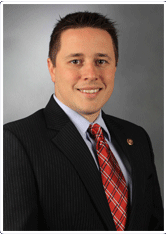 |
| Shown above, Sen. Ryan Silvey, R-Kansas City, speaks with a group of high school students from Winnetonka who travelled to Jefferson City for Missouri Fine Arts Day to talk about funding for arts programs. |
|
When a citizen goes to renew their driver’s license, or register a vehicle, or get new plates, they’re usually walking into what’s known as a fee office. These offices are operated by a nonprofit or private company contracted by the state to perform public services for the Department of Revenue (DOR).
Fee offices were a solution to provide access to these services while keeping the state from owning the offices in every county when first established, especially before the internet. These offices have also provided a profitable business for some, which is why past governors, from both parties, quickly realized awarding fee office contracts were a great way to repay the campaign donors who got them elected. It was an accountability nightmare.
However, reforming this system was something very important to me and something I was proud to have overhauled when I was first elected. My commitment was to stop any blatant quid pro quo by forcing the awarding of these fee offices to be put through a rigorous bidding process, with not-for-profit local organizations given preference--a way to give back to communities. But, as sometimes happens in public policy, the intention of a law has been circumvented or misinterpreted, creating an entirely new set of problems.
Right now, these fee offices are awarded by DOR through a bidding process using a point scale that considers a number of factors. Through this process however, a bidder can receive points on how much the fee office returns to the state. In other words, how much the fee office is willing to pay the state to get in on the game. Instead of awarding these contracts to local charities in the community, they’re going to the lowest bidder who will offer what has the perception of a kick-back. My Democratic colleague, Sen. Gina Walsh, put it aptly when she called it a “pay-for-play scheme.”
This year, I’m again sponsoring legislation, along with Sen. Walsh, to reform the current bidding process. The bill would end the department awarding points to companies for a return-to-state provision offer and requires the director of DOR to strictly follow the bidding procedures in current law--not through some loose interpretation, but as they were intended.
If used responsibly, fee offices should be an effective way to make government services more accessible to citizens. But, we have to make sure the contracts are awarded in a fair manner that gives preference to things like customer service, or ties to the community, rather than how much cash the company is willing to figuratively stuff in an envelope and slip to the state.
That is not how the system is meant to run, and completely goes against the original intention of the 2009 law I authored. Senate Bill 389 would improve the quality, transparency and accountability of the current way fee offices are awarded in Missouri. It’s a much-needed reform to a system that has always been rife with problems.
While it is incredibly important for us to address this issue, it is also critical to look at ways to improve the delivery of the services these fee offices fulfill to our citizens. One way I believe we can continue to improve these services is find ways to harness technology to make services more readily available to citizens. The Internet is an incredible tool and we need to look at the possibility of offering more government services online, which saves both the state and taxpayers money and time.
As always, I am here to serve the 17th District. I welcome any discussion, questions or concerns regarding Missouri government. Please feel free to contact me at the State Capitol: (573) 751-5282, ryan.silvey@senate.mo.gov, or by writing to Sen. Ryan Silvey, Missouri State Capitol, 201 W. Capitol Ave., Room 331A, Jefferson City, MO 65101. |



